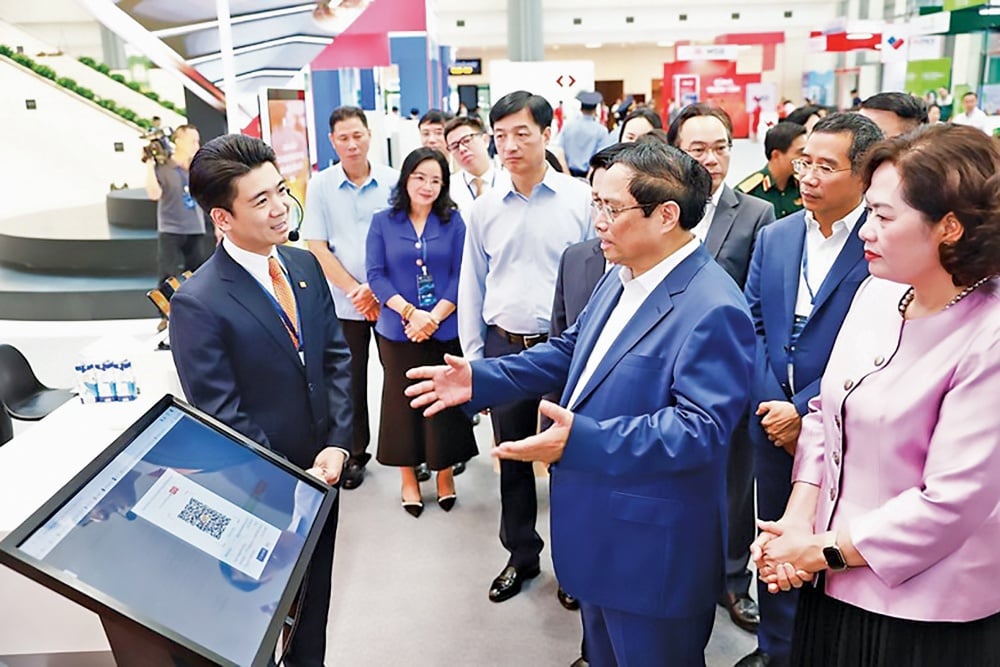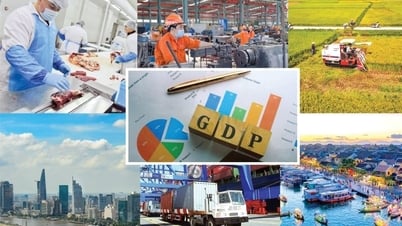 |
| Prime Minister Pham Minh Chinh visits the exhibition booth of digital transformation in the banking industry |
Open the big door
In a simple house nestled in the hustle and bustle of the capital, Mr. Ta Quang Tien - former Director of the Banking Information Technology Department, Head of the Project Management Board "Modernizing banks and payment systems", one of the 10 best information technology directors (CIOs) in Indochina - still feels nostalgic and emotional when talking about the digital transformation journey of the banking industry. He said that in the 1970s and 1980s, the country was still at war, the leaders of the banking industry were very active in bringing information technology into operation, but the investment capital was very limited; the legal foundation for information technology and electronic transactions in banking activities in particular and nationwide was not yet available; the workforce in technology engineering was not large. At that time, banks paid each other mostly manually, sometimes a payment from one province to another took half a month, in the city it took 3-4 days to arrive; Banks are seriously short of cash, inflation sometimes reaches nearly three digits, and bank interest rates are high.
However, a meeting in the late afternoon of the last day of 1994 about the World Bank (WB) wanting to finance Vietnam with a loan of about 30 million USD to build a payment system completely changed this situation.
“All beginnings are difficult” is what Mr. Ta Quang Tien remembers about the process of participating in the modernization of the interbank payment system, because the project had high technology and technical content, while Vietnam's telecommunications infrastructure was still very weak, lacking a legal basis, the bidding process encountered many difficulties, prolonging the implementation time... But with the high determination of the assigned staff, under the close and drastic direction of the leaders of the State Bank at that time, the project was completed spectacularly after 7 years of implementation.
“Up to now, the project is being effective, being upgraded and improved with better technology, effectively serving the operations of the banking industry in particular and contributing to the development of the economy in general,” Mr. Ta Quang Tien proudly said.
After the first arduous steps, it can be affirmed that the banking sector is one of the leading ministries and sectors in digital transformation. Science and technology development and digital transformation have always been the key driving force to help the banking sector accelerate sustainably, improve service quality, and contribute to Vietnam's breakthrough development in the digital age.
From goals to talking numbers
As someone who is devoted to the digital transformation process of the banking industry, Deputy Governor of the State Bank of Vietnam Pham Tien Dung said that digital transformation, in the "simplest and most straightforward" way, is how people can perform all banking services on their mobile phones. On that basis, the State Bank of Vietnam has proactively built and completed the legal corridor, facilitating non-cash payments while ensuring security and safety; regularly directing credit institutions, payment intermediary service providers, financial switching and electronic clearing organizations to research, develop and provide many safe and convenient payment products and services, bringing many benefits and values to customers, people and businesses. Thereby, actively contributing to promoting non-cash payments and financial inclusion in Vietnam.
At the same time, banks are encouraged to research and invest in technology infrastructure and technical solutions for non-cash payments in general and card payments in particular, thereby providing convenient, secure payment products and services, improving user experience, and bringing great and practical benefits to customers.
“Thanks to that, the banking industry has a high level of readiness and is among the priority industries for digital transformation. The State Bank of Vietnam is always in the top of ministries and sectors in digital transformation according to the Ministry of Digital Transformation Assessment Index; for many consecutive years, it has been among the leading ministries and sectors in the Administrative Reform Index; and the growth of digital payments in Vietnam has achieved impressive growth rates,” Deputy Governor Pham Tien Dung affirmed.
Mr. Le Anh Dung, Deputy Director of the Payment Department (SBV), said that by early 2025, the number of personal payment accounts in Vietnam reached more than 200 million. The Vietnamese banking industry has made rapid and strong progress in digital transformation. By early 2025, at many credit institutions, more than 90% of financial transactions were conducted via digital channels, reflecting the great efforts and success of the entire industry with the motto of focusing on customers, providing superior experiences and bringing practical benefits to service users. Most banks have connected and effectively exploited the National Population Database, implementing customer identification through chip-based citizen identification cards. Transaction growth via the Internet, mobile devices and QR codes reached 35%, 33% and 66% respectively compared to the same period in 2024.
“These figures not only demonstrate the speed of digital transformation, but also financial inclusion, helping tens of millions of people, especially in rural and remote areas, access convenient and modern financial services,” Mr. Le Anh Dung affirmed.
Praising the efforts, attempts and achievements of the banking sector and credit institutions, at an event of the banking sector, Prime Minister Pham Minh Chinh affirmed that the State Bank has been highly aware of and resolutely directed the digital transformation work to convert most of the state management activities on banking and credit services to the digital environment, promoting socio-economic development and serving people and businesses better and better, achieving many important results. Accordingly, the legal corridor on digital transformation of the banking sector has gradually been completed, meeting practical requirements. Non-cash services have been widely deployed nationwide with an increasing number of users and payment values; Actively coordinating with the Ministry of Public Security to implement Project 06 and offering many practical products and services to serve people and businesses; Actively deploying the provision of public services of the banking sector online throughout the process and integrating them on the National Public Service Portal and Project 06; Promote policy communication, contribute to creating social consensus, and strengthen people's trust.
Overcoming challenges
In addition to the positive results, the rapid development of science and technology also creates many big challenges for banks and credit institutions. Mr. Nguyen Hung, General Director of TPBank shared that one of them is to have a good enough infrastructure system and technology solutions to ensure competitive advantages compared to other banks, as well as fintech companies or other online business platforms, when the ability to meet customer needs of competitors is very strong. Not to mention, the rapid changes in customer preferences and habits also pose a great task for banks when they always have to research, study, and continuously innovate products to meet the increasing and diverse needs. Finally, maintaining and improving consistency and synchronization in customer experience across all transaction channels is also an important requirement.
Along with that, the Vietnamese banking industry also faces a number of challenges in complying with international standards such as the International Financial Reporting Standards (IFRS) of the International Accounting Standards Board (IASB). In addition, the application of new technologies such as Biometric, AI/Deep Learning, Machine Learning in practical applications of banks is also an inevitable trend to achieve the goal of increasing customer experience, reducing costs, and digitizing services to expand the market. Currently, digital banking products have almost no clear differences. To improve this, it is necessary to apply and improve digital banking activities more, from building and upgrading infrastructure to applying new solutions from solution providers. However, the professional foundation is still fundamental, especially high-quality human resources.
To make digital banking transformation more effective, a representative of the Military Commercial Joint Stock Bank (MB) said that it is necessary to issue specific regulations on banking data security, ensuring network security standards and risk management processes. The legal system must also comply with international standards. Banks need to take clear responsibility when security violations occur and have strict sanctions for non-compliance. In addition, it is necessary to build a mechanism to protect users' rights, establish a dispute resolution process and regulations on privacy protection. Strengthening cooperation between regulatory agencies and international cooperation is an important factor in dealing with high-tech crimes...
In addition, the banking system needs to identify risks, thereby regularly updating security policies to protect customers' interests, contributing to enhancing the reputation and sustainable development of banks in the context of increasingly complex network security. Authorities need to more effectively implement measures to deal with methods and tricks of criminals in electronic banking activities, thereby proposing solutions to ensure security and confidentiality.
Continuing the success
2025 is considered a year of acceleration, breakthrough, reaching the finish line, striving to achieve the highest results in the goals and targets of the 5-year Socio-Economic Development Plan 2021-2025. In particular, the Party, the National Assembly, and the Government set the goal for 2025 to continue to prioritize promoting growth on the basis of maintaining macroeconomic stability, controlling inflation (average of about 4.5%), ensuring major balances of the economy. Highly focus on supplementing and perfecting the legal framework; reforming and streamlining the apparatus and administrative procedures; strongly promoting digital transformation... to best meet the requirements of innovation, creating breakthroughs in national development in the new situation, towards a new era - the era of national development.
In 2025, the Prime Minister requested the banking sector to build a national database of customers, connecting with population data to promote digital transformation and develop the digital economy. Coordination with the Ministry of Public Security will help effectively exploit information on chip-based citizen identification cards, VNeID, improving safety and convenience in providing banking services. The banking sector needs to expand data connectivity with ministries, branches, and apply advanced technologies such as artificial intelligence (AI) and big data to develop modern services and secure customer information. At the same time, focus on training, attracting high-quality human resources, and learning from international experience to meet digital transformation requirements.
In addition, the Prime Minister also emphasized that ensuring security and preventing high-tech crimes is an urgent task. The banking sector needs to closely coordinate with the Ministry of Public Security and management agencies in controlling risks, monitoring and preventing financial crimes; strengthening propaganda work, helping people and businesses understand the benefits of digital transformation, thereby promoting active participation in the digital financial ecosystem.
Mr. Nguyen Quoc Hung, Vice Chairman and General Secretary of the Vietnam Banks Association (VNBA), proposed that in the coming time, the digital transformation process in the finance and banking industry will continue to be accelerated and focus on the following main tasks: continuing to build and perfect the legal framework to promote digital transformation in the banking industry; encouraging the application of digital technologies such as AI and blockchain; developing open banking, electronic transactions, security and safety on the Internet; as well as testing fintech through sandboxes. In addition, it is necessary to implement data and technical standardization to connect and share data inside and outside the banking industry, along with research on digital currencies.
In parallel, it is necessary to develop digital infrastructure, modernize the payment system and enhance connectivity, including upgrading the inter-bank electronic payment system (IBPS) and expanding the infrastructure for retail payments with new payment methods such as QR, e-wallet and mobile payment. At the same time, expand the data processing infrastructure and upgrade the credit information portal to support risk management. Develop and exploit digital data of the State Bank and credit institutions effectively according to the big data model, while promoting data collection and cleaning. Develop and train high-quality human resources with knowledge and skills in using information technology and digital transformation skills...
Proposing some orientations in the digital transformation process of the banking sector in the coming time, Deputy Governor Pham Tien Dung said that the SBV will review, evaluate the results, promote the implementation of the Digital Transformation Plan of the banking sector to soon achieve the goals; Continue to focus on perfecting institutions, closely coordinate with relevant ministries and branches to accelerate the review, amendment, and promulgation of legal documents to promote digital transformation of the banking sector; Continue to closely coordinate with the Ministry of Public Security to effectively implement Project 06; Increase resources for digital transformation, promote technology application, innovate and provide a variety of convenient products and services at reasonable costs for people and businesses; Continue to promote financial education and communication for people and businesses to use banking services on digital channels safely and effectively.
Source: https://thoibaonganhang.vn/chuyen-doi-so-nganh-ngan-hang-hanh-trinh-khong-ngung-doi-moi-163617.html





![[Photo] General Secretary To Lam begins official visit to Russia and attends the 80th Anniversary of Victory over Fascism](https://vphoto.vietnam.vn/thumb/1200x675/vietnam/resource/IMAGE/2025/5/8/5d2566d7f67d4a1e9b88bc677831ec9d)
![[Photo] General Secretary concludes visit to Azerbaijan, departs for visit to Russian Federation](https://vphoto.vietnam.vn/thumb/1200x675/vietnam/resource/IMAGE/2025/5/8/7a135ad280314b66917ad278ce0e26fa)
![[Photo] Prime Minister Pham Minh Chinh meets with the Policy Advisory Council on Private Economic Development](https://vphoto.vietnam.vn/thumb/1200x675/vietnam/resource/IMAGE/2025/5/8/387da60b85cc489ab2aed8442fc3b14a)
![[Photo] National Assembly Chairman Tran Thanh Man chairs the meeting of the Subcommittee on Documents of the First National Assembly Party Congress](https://vphoto.vietnam.vn/thumb/1200x675/vietnam/resource/IMAGE/2025/5/8/72b19a73d94a4affab411fd8c87f4f8d)
![[Photo] President Luong Cuong presents the decision to appoint Deputy Head of the Office of the President](https://vphoto.vietnam.vn/thumb/1200x675/vietnam/resource/IMAGE/2025/5/8/501f8ee192f3476ab9f7579c57b423ad)
















































![[Photo] Prime Minister Pham Minh Chinh talks on the phone with Singaporean Prime Minister Lawrence Wong](https://vphoto.vietnam.vn/thumb/402x226/vietnam/resource/IMAGE/2025/5/8/e2eab082d9bc4fc4a360b28fa0ab94de)

































Comment (0)